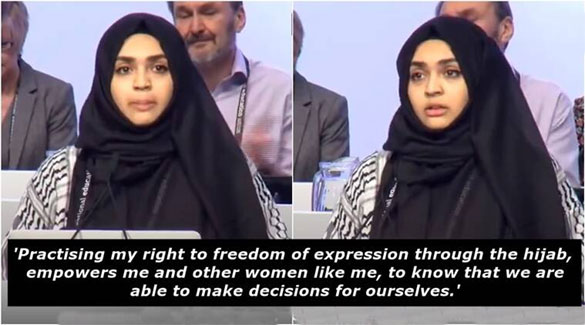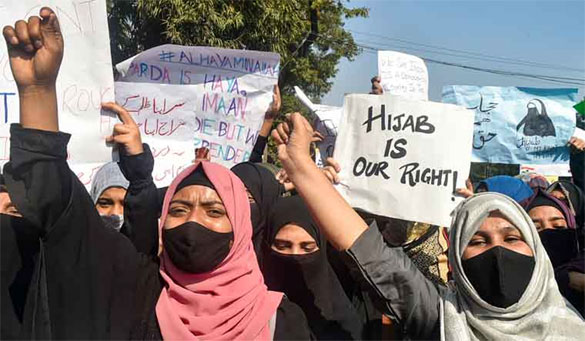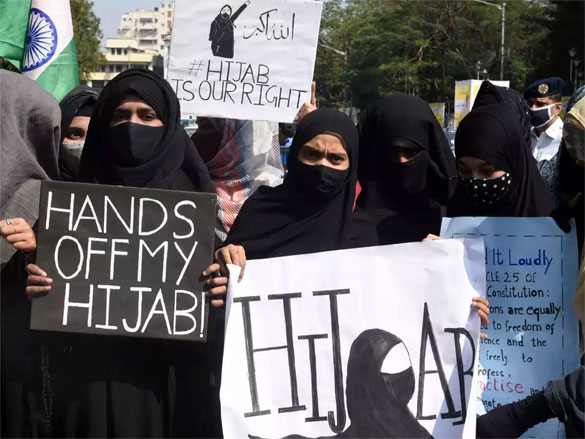Traditional Indian Ulema's View of Hijab: The High Court Decision That Hijab Is Not An Essential Part Of Islam Is Unacceptable
Muslim
Leaders and Scholars on Hijab Verdict of the Karnataka High Court
Main
Points:
1. Darul Uloom
Deoband: the court's statement that "Hijab is not an essential part of
Islam" was wrong.
2. Muslim
Personal Law Board: The Karnataka High Court's verdict on the Hijab is
contradictory to Islamic principles and Article 15 of the Constitution.
3. President of
the Jamiat Ulema-i-Hind said that the Karnataka High Court's decision on the
Hijab is harmful to the country and Muslims
4. Prof.
Akhtarul Wasey on Hijab Verdict: This decision is in stark contradiction to the
Qur'an. Along with Article 25, he stated, “basic rights are also being
violated. Muslims must present themselves to the Supreme Court in a peaceful
manner.
5. Mufti
Mukarram, Imam of Fatehpuri on Hijab Verdict said, “Hijab is not a trivial
concern; it is an essential way of Muslim life, as it is addressed in both the
Holy Quran and Hadith.
-----
By
Kaniz Fatma, New Age Islam
21 March
2022

The ban on
Hijab was sealed when the Karnataka High Court on Tuesday delivered a verdict
in the Hijab case. The controversy started with an objection to the Hijab in a
college. It lasted for a long time and after an eleven-day hearing, the
decision was reached. However, this decision was not accepted by the majority
of Muslims, Ulama and scholars of several organizations. They rejected this
decision. Not only this, the matter has now reached the Supreme Court. The
social, religious and scholarly figures from among the Muslims have strongly
opposed it. No one is willing to accept it, from Barelvi to Deobandi, Sunni to
Shia, and All India Muslim Personal Law to Darul Uloom Deoband. The following
are statements made by religious figures and clerics.
Darul
Uloom on Hijab Verdict
Maulana
Mufti Abul Qasim Nomani, superintendent of Darul Uloom Deoband, termed the
Karnataka High Court's decision on Hijab as unacceptable and said that the
court's statement that "Hijab is not an essential part of Islam" was
wrong. It is obligatory and the Qur'an commands it.
The Darul
Uloom reacted quickly to the situation and called on national organizations to
petition the Supreme Court to overturn the Karnataka High Court's decision on
the Hijab.
According
to Mufti Nomani, India is a democratic society where no government-recognized
educational institution has the authority to pass laws that are incompatible
with any faith or culture.
Mufti Abul
Qasim Nomani said he hadn't seen a copy of the High Court judgement yet and
couldn't make a definitive statement at this time. However, it has been shown
that the Karnataka High Court's verdict is incorrect and should be overturned.
Muslim
Personal Law Board said,
“The
Karnataka High Court's verdict on the Hijab is contradictory to Islamic
principles and Sharia law. The court's judgement also violates Article 15 of
the Constitution, which prohibits discrimination on the basis of religion,
race, caste, or language. The regulations that must be followed are mandatory,
and breaking them is a sin. In this sense, wearing the Hijab is an obligation.
If one does not obey this guideline, he does not leave Islam, but he does
become a sinner. Therefore, it is incorrect to assert that Hijab is not an
Islamic obligation.” Hazrat Maulana Khalid Saifullah Rahmani, General Secretary
of All India Muslim Personal Law Board expressed these views in his press
statement.
He further
stated that many Muslims, due to their carelessness and negligence, disregard
some Shariah commandments, such as not praying and fasting. This isn't to say
that prayer and fasting aren't required. Every citizen has the fundamental
freedom to dress as he likes, to cover some portions of his body as he wishes,
and to leave other parts open. In this context, any government restriction is
akin to a violation of an individual's freedom.
He said,
“It is also true that there are religious groups in our country, and they
frequently use their religious symbols; the government would authorise the
usage of special religious symbols for certain religious sects. Yes, even the
aviation law has been amended for them. In this circumstance, prohibiting
Muslim students from wearing Hijab would be a kind of religious discrimination.
It's also worth emphasising that schools have the authority to select uniforms,
and the case that went to the High Court is about a college, not a school. As a
result, the administration did not have the authority to enforce the uniform on
its own, according to the rules.”

Harmful To
The Country And Muslims: Maulana Mahmood Madani
Maulana
Mahmood Madani, president of the Jamiat Ulema-i-Hind, reacted to the Karnataka
High Court's decision on the Hijab, calling it harmful to the country and
Muslims. He said that this would have a direct impact on religious freedom.
According
to Maulana Madani, no society can be ruled solely by legal details; it must
also be socially and traditionally acceptable. He said, “This decision would
have a number of negative consequences, particularly for Muslim girls'
education, and that they would lose their independence and trust in the
existing scenario. Our country has a long and illustrious history and culture.
For generations, Muslim women's ideas and concepts have emphasised the
significance of wearing a veil and remaining modest. A judicial decision alone
will not be enough to put an end to it.”
Maulana
Madani stressed that religious decisions should be founded on the established
ideas of the religion's authorised scholars and jurists and that the courts
should not adopt a different course in this regard. Maulana Madani urged the
country's state governments and the federal government to uphold their
responsibilities to maintain the country's Muslim culture and tradition. If the
problem is not addressed by the court, the parliament and assembly have the
power to establish laws in a democracy. As a result, the legislature must act
in the national interest (Rashtra Heet). Maulana Mahmood Madani appealed to the
youth to refrain from protesting on the streets and taking the law into their
own hands and showing patience.
Not According
To Islamic Teachings And Sharia Law: Maulana Arshad Madani
Maulana
Arshad Madani, President of the Jamiat Ulema-i-Hind, while reacting to the
decision of the Karnataka High Court regarding the hijab, said that the
decision of the court is not in accordance with Islamic teachings and Shariah
rules regarding the hijab.
“Disobedience
to the required commands is a sin. In this perspective, wearing the hijab is an
essential rule; if one does not obey it, he does not renounce Islam; instead,
he is a sinner who deserves Allah's displeasure and punishment in hell. As a
result, claiming that the veil is not a necessary aspect of Islam violates Shari'ah.
These individuals believe it is important to state that anyone who disobeys
this order would be ejected from Islam, which is incorrect. However, Maulana
Madani also stated that Muslims do not give prayers or fast due to their
negligence, which does not negate the importance of prayers and fasting”, he
said.
Maulana
Madani also said “Only schools have the authority to impose uniforms. The case
before the High Court was not about the school, but about the college. The
issue is that the Constitution provides that every person of the country enjoys
full freedom of religion, adherence to religious law, and worship under the
authorities given in Article 25 of the Constitution and its sub-clauses.”
He further
said, “The government has no official state religion, but it allows all
residents to exercise and worship whatever religion that they believe in,
according to Maulana Madani. Yes, secularism demands that the government not
impose the religious identity of any specific religion on all citizens. Hijab is
a religious obligation based on the Qur'an and Sunnah, as well as a natural and
sensible demand for us.”

Hijab Issue
Is Not The Job Of The Court: Statement Of The Ameer Of Jamaat-E-Islami Of India
The Ameer
of Jamaat-e-Islami India (JIH), Syed Saadatullah Hussaini, has stated that it
is not the role of the court to decide on the necessary rituals of any
religion. In response to the Karnataka High Court's Hijab judgement, he stated
that JIH did not agree with the verdict.
"We
disagree with the Karnataka High Court's verdict," Hussaini stated.
"We feel it is not the role of the courts to decide on a religion's basic
religious activities," he stated. "The Supreme Court will make the
necessary modifications in this ruling and will not allow any incorrect precedent
to be formed," he hoped.
“We are
gravely worried by some sectors of the media's misreporting that the court has
imposed some form of Hijab prohibition. The decision has nothing to do with
whether or not women should wear the Hijab in public or private. He noted that
"this (judgement) is restricted to the accuracy of the government order
permitting the management of publicly supported institutions to recommend dress
rules. It is not good to try to create any kind of discrimination or mistrust
among the citizens through such misinterpretation of court decisions” he said,
expressing that JIH is not against the practice of uniform in educational
institutions.
He urged
that when deciding on the clothing code, public-funded institutions maintain
impartiality and respect for the religious and cultural practises of the pupils
involved, taking into account their religious principles, cultural
inclinations, and conscience.
“We are
gravely worried that this verdict may prevent Muslim women from receiving an
education and that it contradicts the government's declared aim of including
all communities and social groups in the development process. Education is a
top concern for the country, and it tries to provide a climate where everyone
can pursue their education without having to sacrifice their beliefs or
conscience”, he said.
Maulana
Ahmad Wali Faisal Rahmani’s reaction
The
Ameer-e-Shariat of Bihar, Odisha, and Jharkhand, Maulana Ahmad Wali, stated
that it is the role of theologians to interpret religion. In response to the
Karnataka High Court's recent judgement on the topic of Hijab, he stated that
the court stated that the veil is not necessary in Islam, which he believes is
completely false. “It is the role of theologians, not the courts, to interpret
religion,” he said.
He added
saying, “By relying on an analysis of essentiality, the court misconstrued the
necessity of Hijab. We are not in disobedience to the court. However, we
recognise that the court's jurisdiction does not extend to the interpretation
of religious rules. The court is responsible for ensuring religious freedom,
whereas the process of interpreting religion inhibits it. The unavoidable
result of doing both would be that the courts would be unable to effectively
protect religious freedom.”
He further
said, “The court's determination on what is and is not essential in religious
rulings amounts to a violation of religious liberty. Because courts are legally
secular, they should not interpret religious laws. The professionals in this
religion are responsible for the interpretation of religious laws. The Supreme
Court is also responsible for the interpretation of the constitution. Declaring
Hijab as a non-essential aspect of Islam is certainly a wrong decision. This
will erode public faith in the court, and a loss of public confidence in a
country's judiciary is not a positive indicator for that country's democratic
system.”
He urged
the government to implement a clothing code in schools and universities based
on regional traditions and religious tenets, so that every citizen feels
comfortable and secure, and that personal freedom, including freedom of
expression, is protected. As a result, all Muslims in the country should read
the Qur'an and Hadith in this respect, study the country's constitution regarding
freedom of expression, and freely transmit their message to local public
officials and administrations, as well as defend their Islamic culture.
Qari
Altaf-ur-Rehman the Imam of Eidain in Kolkata
He said
"It would be incorrect to assert that Hijab is not an obligation of Islam.
It could be a lack of knowledge. It's unclear who failed to inform the judges
about this aspect or who conveyed it to them. But let me make it clear that the
Hijab is addressed in Surah Noor and Surah Ahzab, and the Qur'an is extremely
clear about it. I believe there is an attempt to entrap Muslims in one issue
after another. However, the law is the only hope and Muslims have to fight this
battle legally within the ambit of the constitution.”
Prof.
Akhtarul Wasey on Hijab Verdict
“This
decision is in stark contradiction to the Qur'an," argues prominent
scholar and Padam-Shri Prof. Akhtarul Wasey. The veil is clearly mentioned and
explained in Surah Noor and Surah Al-Ahzab of the Holy Qur'an. Along with
Article 25, he stated, “basic rights are also being violated.”
Prof.
Akhtarul Wasey further said, “Muslims do not need to protest or demonstrate
against it; this is a legal battle that must be fought. Muslims must present
themselves to the Supreme Court in a peaceful manner.”
Mufti Mukarram,
Imam of Fatehpuri on Hijab Verdict
Dr Maulana
Mufti Muhammad Mukarram Ahmed, Imam of Fatehpuri Mosque, Delhi and eminent
Islamic scholar, said “He has no choice but to show regret. However, there is
no need to be sentimental. The most crucial thing is to keep your foot in
place. This is a legal battle that will be fought democratically and according
to the law. Of course, we revere justice but justice must also be visible. The
court appears to have authored a well-considered decision. Surprisingly, the
defence counsel's arguments and reasoning failed to persuade the High Court.”
Mufti
Mukarram Ahmed further said “Hijab is not a trivial concern; it is an essential
way of Muslim life, as it is addressed in both the Holy Quran and Hadith. This
is the Prophet Muhammad's (peace be upon him) rule. This is a piece of history
that dates back about 1450 years. In any event, I am hopeful that the court
will ease the Muslims' distress.”
Translated
from Urdu Report https://www.urdu.awazthevoice.in/india-news/hijab-case-decision-unacceptable-protest-not-wisdom-muslim-intellectuals-and-scholars-13174.html
Maulana
Kalbe Jawad, the general secretary of Majlis-e-Ulama-e-Hind on Hijab Verdict
Maulana
Kalbe Jawad, a prominent Shia cleric and the general secretary of Majlis-e-Ulama-e-Hind,
said on Saturday that the Hijab controversy was an "example of
Islamophobia" and that Muslims should establish as many educational
institutions as possible so that they do not have to rely on others for their
education. “Hijab is a fundamental element of Islam," he remarked. We
respect the court, but it appears that no genuine effort was made to comprehend
the situation.” “The hijab is not an impediment in any way. Different religions
are permitted to utilise their religious symbols in social and public settings.
He inquired, "Why are Muslims being prevented from doing so?”
https://timesofindia.indiatimes.com/home/education/news/hijab-row-example-of-islamophobia-shia-cleric-maulana-kalbe-jawad/articleshow/90345637.cms
URL: https://www.newageislam.com/islam-women-feminism/traditional-ulema-hijab-high-court-/d/126618
New Age Islam, Islam
Online, Islamic
Website, African Muslim News, Arab World News, South Asia News, Indian Muslim News, World Muslim News, Women in Islam, Islamic Feminism, Arab Women, Women In Arab, Islamophobia in America, Muslim Women in West, Islam Women and Feminism
